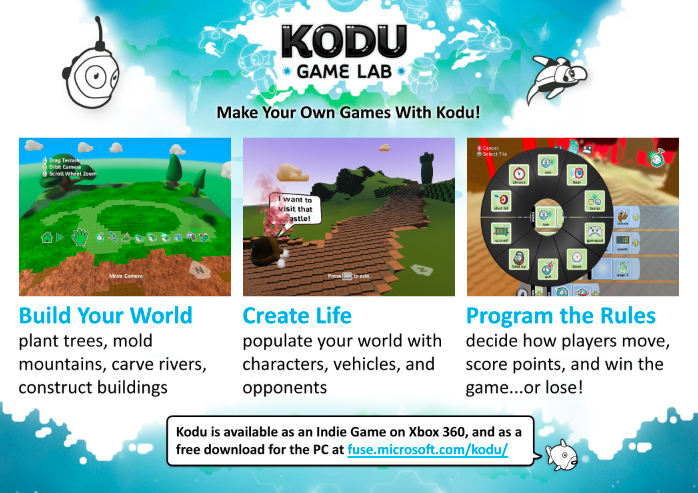Making Games Can Contribute to Learning
Editor’s Note: Today we announced the full availability of Microsoft Kodu Game Lab for the PC and the launch of a nationwide Kodu Cup competition. We’re inviting students, aged nine to 17 to design, build and submit their own video games. The following is a guest blog post about the educational benefits of video games and video game design from Gabrielle Cayton-Hodges, Research Fellow, The Joan Ganz Cooney Center at Sesame Workshop, which specializes in advancing children’s learning in the digital age. |
There's a growing body of evidence that both playing video games and making video games have promise as educational tools. In fact, it may be one of the most effective ways to engage today's youth as they learn the critical skills they will need to succeed. As the Federation of American Scientists concluded from its 2006 Summit on Educational Games:
“The success of complex video games demonstrates that games can teach higher-order thinking skills such as strategic thinking, interpretative analysis, problem solving, plan formulation and execution, and adaptation to rapid change. These are the skills U.S. employers increasingly seek in workers and new workforce entrants. These are the skills more Americans must have to compete with lower cost knowledge workers in other nations.”
In fact, game-based learning has emerged as one of the most promising areas of innovation in making Science, Technology, Engineering, and Mathematics (STEM) topics more engaging for kids today. The report Game Changer: Investing in Digital Play to Advance Children’s Learning and Health , demonstrates that video games can be used to learn not only content, but also STEM skills and systems thinking, which are essential for preparing youth for STEM careers.
Additionally, real-time 3-D action video games have been proven to improve cognitive skills such as attention and other executive functioning. These skills enhance learning in a wide array of areas and are also tied to number sense, a skill critical for early math learning in and out of school.
Researchers are finding that making games fosters the development of critical STEM skills. Our colleagues at E-line Media have shown that a well-designed game is a well-designed system with a delicate balance of goals, constraints, challenges and rewards. Learning how to create and edit such a system is learning critical analytic skills including systems thinking, problem solving, iterative design and digital media literacies.
This is not to say that we advocate children playing all video games and without restriction. Many games obviously have violent themes that are not age-appropriate. And some genres of games have proven more beneficial than others. For example, the cognitive skills that are enhanced with 3D action game play are not enhanced by other game genres, such as simulation games. We also know that some games are better for “transfer” than others (for example, playing many hours of Tetris will make you very quick at rotating Tetris shapes, but no better at any other mental rotations). There is still a lot of research to be done in this area, so we encourage parents to look critically and wisely at the games their children are playing. If something looks inappropriate, be cautious, but also keep an open mind while exploring redeeming qualities.
This past winter in the U.S., the Cooney Center and E-line Media launched the National STEM Video Game Challenge, in partnership with sponsors AMD Foundation, Entertainment Software Association and Microsoft. The goals were: (1) encouraging children to create video games and (2) encouraging game developers to make games that can truly educate and inspire children in STEM subjects. This effort was a huge success, with over 550 applications. Fourteen Youth winners (grades 5-8) were recently named and the Developer winners will be named on March 30th in Washington, D.C. Our Youth submissions came from programs designed to teach kids how to make games (such as Kodu and Gamestar Mechanic) as well as open platforms such as Flash that are frequently used by adult game developers. Developer finalists submitted games in many platforms--from SMS to Flash to Unity--and over many content areas, from biology to number sense to systems thinking.
For a sneak peek at some games that were entered into the challenge, take a look at our Popular Vote Award contestants and the winner, Ko’s Journey, which is a promising example of mathematics being integrated into the storyline of a game.
Gabrielle Cayton-Hodges is a Research Fellow at The Joan Ganz Cooney Center at Sesame Workshop
Download Microsoft Kodu Game Lab today.
For information about entering Microsoft’s new video game design competition for kids ages 9-17 in the U.S., visit Kodu Cup, visit www.koducup.us. Happy Gaming!

